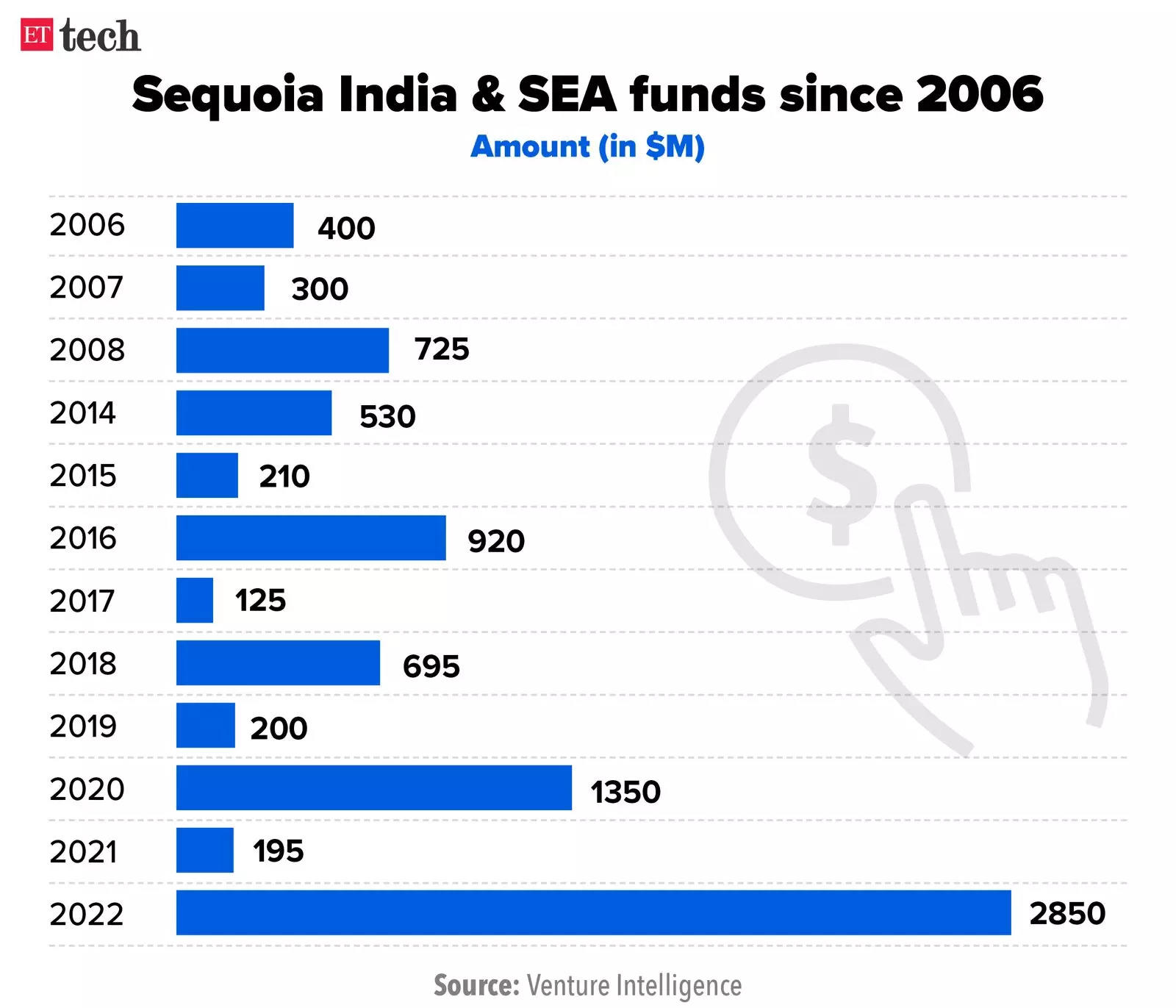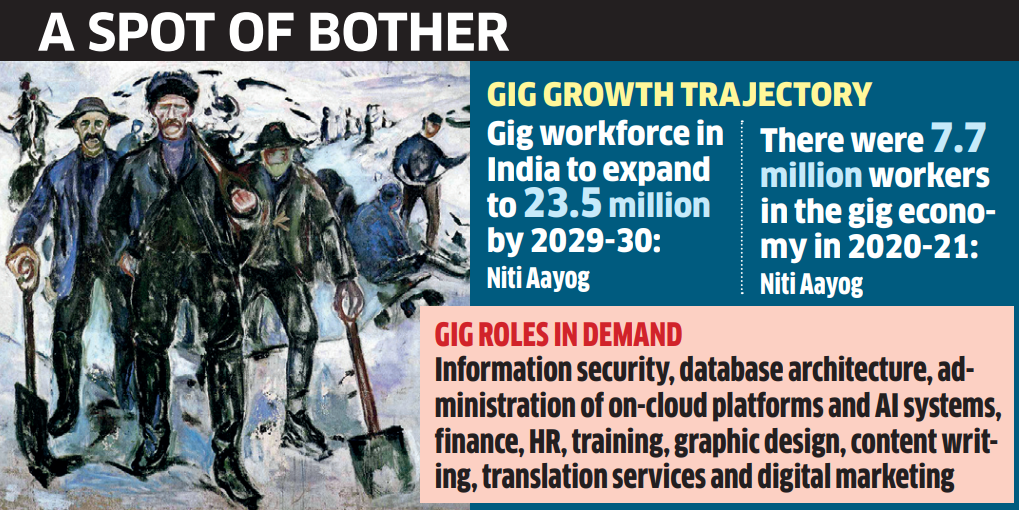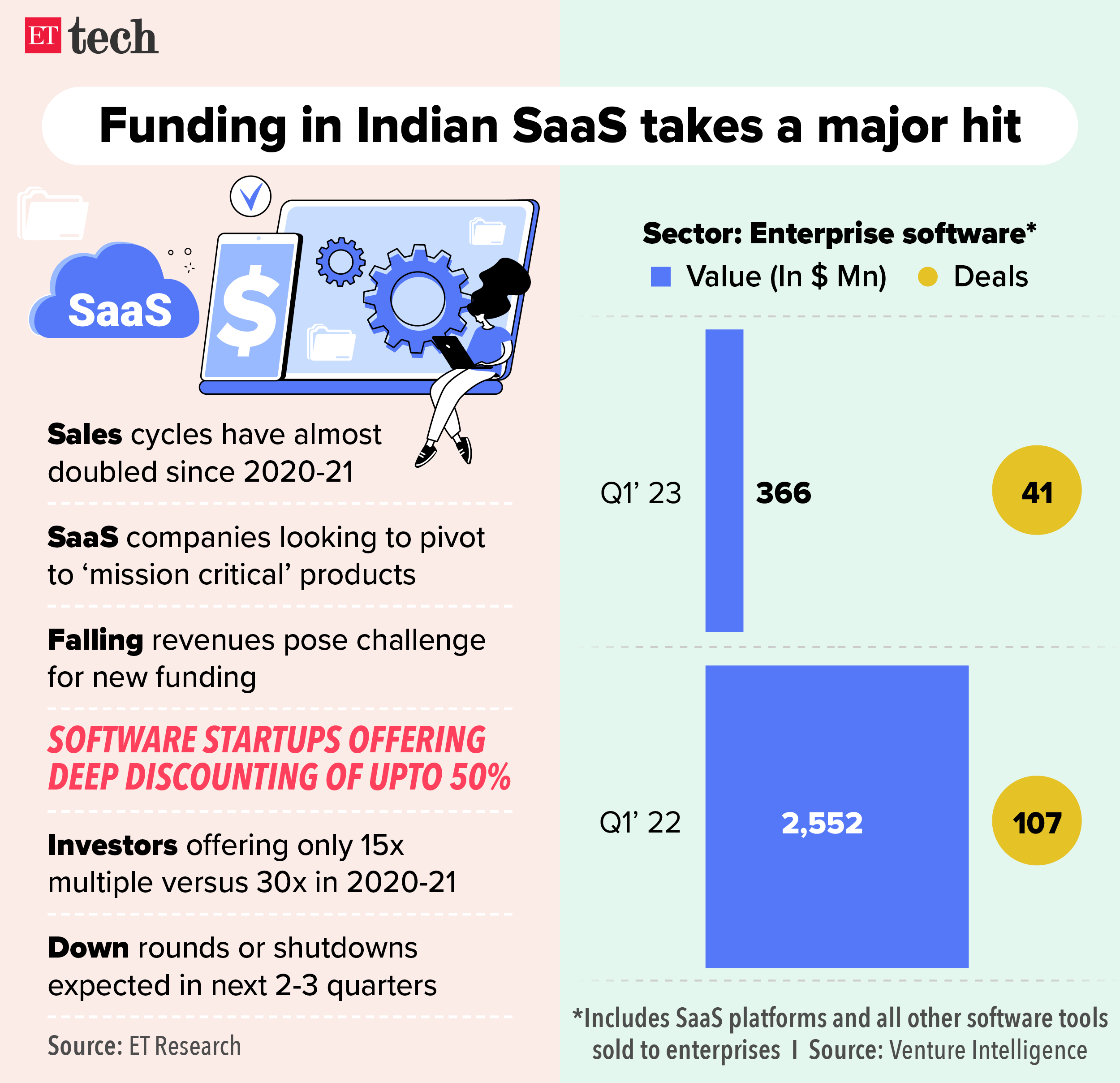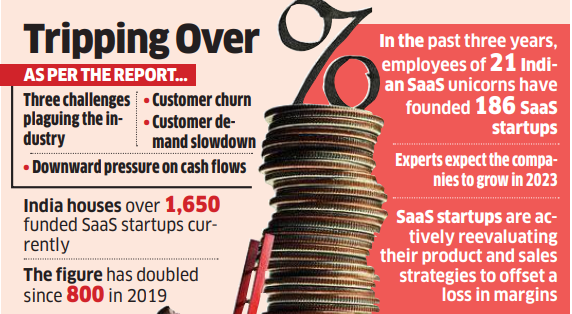Sequoia India & SEA split from US, renamed Peak XV; Byju’s misses $40m loan payment, sues lender
Also in the letter:
■ Gig roles eat into full-time IT jobs
■ Projections indicate weak Q1 for Indian IT
■ 2023 revenue forecast for SaaS startups plunges
Sequoia India & Southeast Asia split from Sequoia US; rebranded as Peak XV Partners

Peak XV Partners managing directors (L to R) Rajan Anandan, Shailendra Singh, Mohit Bhatnagar, GV Ravishankar
Sequoia Capital, the marquee Silicon Valley investor in early-stage companies, has broken away from its India and China partnerships, signalling a retreat from Asia for the fund that had backed technology giants Apple and Google in its early days. Sequoia India & Southeast Asia has been rebranded as Peak XV Partners.
Farewell note: In a letter to its limited partners, or investors in its funds, Sequoia cited increasing complexities in running a “decentralised global investment business”, and portfolio conflicts across its various entities, for the restructuring.
While Sequoia India and China were run independently, profits from the franchises were shared among the global partnership, which will end now. The funds will not invest together going forward.
Avoiding ‘brand confusion’: Shailendra Singh, managing director of Peak XV Partners, said the scale of Sequoia’s funds and their market leadership was causing brand confusion and portfolio conflict.

India investments to continue: The VC fund began investing in India in 2005 and closed its first fund of $400 million in 2006. Its latest fund for the region, at $2.85 billion, will continue to be deployed under Peak XV.

Currently, the India & Southeast Asia entity has $9 billion worth of assets under management, having backed some of the top consumer internet startups in India, including Razorpay, Cred, Unacademy, Mamaearth, and Pine Labs.
Also read | Exclusive: Sequoia’s Shailendra Singh on corporate governance, VC accountability, frothy tech valuations and more
Byju’s misses $40 million loan payment; sues lender Redwood

The long-drawn saga playing out between Byju’s and its lenders has taken a new twist, with the edtech company saying it has sued the lender, Redwood, and its related entities in the New York Supreme Court for accelerating the repayment of the $1.2 billion Term loan B (TLB), calling their demands “high handed”. The edtech firm missed the quarterly interest payment of $40 million on the TLB.
Byju’s’ charges: Byju’s has taken legal action to “disqualify” Redwood, accusing it of employing “predatory tactics” and intentionally increasing its stake in the TLB to gain excessive profits, the company said in a statement.
In response to the dispute between the parties, Byju’s has decided to halt further payments to the TLB lenders.

Also read | Timeline: Byju’s $1.2 billion loan saga
Previous negotiations: ET reported in April that Byju’s’ lenders had demanded a prepayment of up to $200 million (approximately Rs 1,600 crore), and that the company was offering a higher rate of interest to restructure its $1.2 billion (Rs 9,600 crore) TLB.
Last month, Byju’s closed a Rs 2,000-crore round from Davidson Kempner Capital in a structured credit transaction against the cash flows of its IPO-bound test-prep subsidiary Aakash Educational Services. Byju’s was expected at the time to use some of the new capital to refinance parts of its TLB, ET reported on May 13.
Tech slowdown toll: 6 out of 10 companies hiring more gig workers

The pace of hiring for permanent roles across IT firms is slowing down, and gig workers are the reason why.
Driving the news: According to a study by CIEL HR Services shared exclusively with ET, permanent jobs have grown by less than 5% in 2023 vs 2022, while the number of gig workers has increased by 40%.
Most of the leading IT services companies, including Tata Consultancy Services, Infosys, and Tech Mahindra, either already have a gig hiring platform, or are allowing employees to take up external gigs (post their manager’s approval).

What’s driving this trend? Amid an uncertain business environment, gig workers offer greater flexibility to companies as they can hire them on an as-needed basis without the commitments associated with permanent employees.
“Gig work can be leveraged by enterprises to get access to a talent pool, and offer them the opportunity and enhance their skills,” said Manoj Shikarkhane, chief human resources officer, LTIMindtree, which has launched a platform called ‘GigSpace’.
Policy push: Seeing the expansion of the gig workforce, the government is pushing for more policies to safeguard their interests, a government official said. Several policies are in the works to cover this workforce, including on minimum wages, working hours, social security contributions, etc.
Tweet of the day

A further demand slowdown awaits Indian IT firms in the quarter ending June, going by the latest results of global software-as-a-service (SaaS) and digital engineering firms.
What’s happening? According to an ICICI Securities report, SaaS and digital engineering companies’ commentary and revenue guidance suggests weak demand in the June quarter, with a revival of demand in the second half of the fiscal. “(This is) because even though the sales cycle is lengthening, the pipeline is not shrinking. Plus, there is demand from cost-optimisation opportunities,” it said.

“Delays in client decision-making and pullbacks in discretionary spending have implications for the growth of Indian IT. We expect revenues in the first quarter of FY23-24 to be weaker than the fourth quarter of FY22-23 across companies in our coverage universe,” Kotak Institutional Equities also said in a note.
Link between SaaS and IT firms: The performance of digital engineering firms like Globant, EPAM, and Endava can be considered a proxy for the demand for high-end digital services, said the note by research analysts Sumeet Jain and Aditi Patil. Indian IT companies have partnerships with SaaS firms like Servicenow, Salesforce, Snowflake, and Workday.
Digital components make up at least 40% of a typical Indian IT firm’s revenue.
IT firms wary: All leading Indian IT firms – Tata Consultancy Services, Infosys, HCLTech and Wipro – had called out project delays or ramping down of deals because of weak macroeconomics and tightening of spends.
ET Ecommerce Index
We’ve launched three indices – ET Ecommerce, ET Ecommerce Profitable, and ET Ecommerce Non-Profitable – to track the performance of recently listed tech firms. Here’s how they’ve fared so far.

A report has cautioned of turbulent times for the Indian software-as-a-service (SaaS) industry.
What’s the news? Global management consulting and strategy advisory firm Zinnov and Chiratae Ventures have marked down the 2026 revenue projections of Indian SaaS startups from $100 billion to $26 billion in its latest annual report titled ‘India SaaSonomics: Navigating Growth and Efficiency’.
The report indicated four challenges plaguing the industry: customer churn, demand slowdown, extended sales cycles, and downward pressure on cash flows caused by macroeconomic headwinds.

Tell me more: The report stated that a decline in SaaS firms’ valuations in the public markets had greatly affected the private markets, driving down late-stage funding. Stable venture capital deal volumes in the first quarter of 2023 suggest that the funding slowdown in the sector has bottomed out and that a gradual recovery is expected in the near future.

Flashback: ET had reported in April that SaaS startups are actively re-evaluating their product and sales strategies to offset narrowed margins, customer churn, and slowdown in the sales cycle.

Wipro CEO Thierry Delaporte
Wipro launches a suite of banking and financial services built on Microsoft Cloud: The partnership will club the capabilities of Microsoft Cloud with Wipro FullStride Cloud, and leverage Wipro and Capco’s domain expertise in financial services.
PhonePe launches Account Aggregator services: Digital payments major PhonePe on Tuesday announced the launch of its Account Aggregator (AA) services through a wholly-owned subsidiary, PhonePe Technology Services Pvt Ltd (PTSPL).
Global Picks We Are Reading
Don’t want students to rely on ChatGPT? Have them use it (Wired)
How the digital nomad went corporate (Financial Times)
Fans use AI deepfakes to keep a slain Indian rapper’s voice alive (Rest of World)
For all the latest Technology News Click Here
For the latest news and updates, follow us on Google News.

